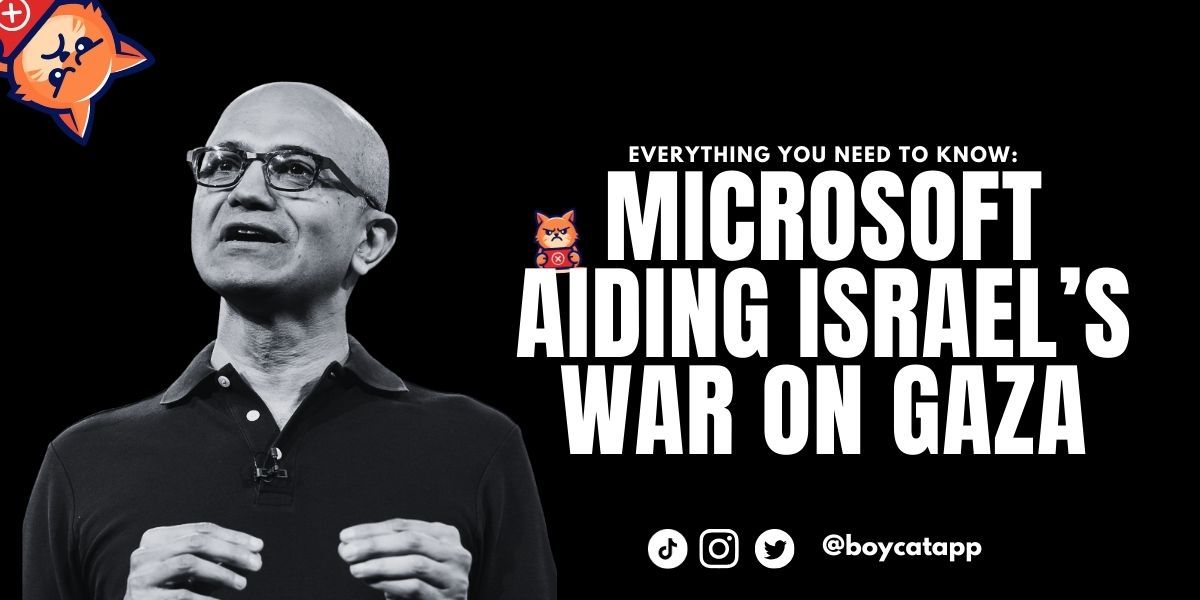Everything you need to know about how Microsoft aided Israel’s war on Gaza.

While the world watched Gaza burn, Microsoft was quietly powering the machines behind the war.
Leaked documents have revealed that Microsoft provided Israel’s military with advanced cloud computing, artificial intelligence tools, and direct engineering support during its ongoing war on Gaza. These services weren’t just for spreadsheets or email. They were part of a deadly digital infrastructure used to monitor, track, and help target Palestinians.
At the same time that bombs were falling and entire neighborhoods were being destroyed, Microsoft deepened its relationship with the Israeli Ministry of Defense. For years, Microsoft has worked closely with the Israeli government, but after October 2023, that partnership expanded significantly and dangerously.
The Leaks: What We Now Know
The Guardian, +972 Magazine, and Local Call uncovered internal documents from Microsoft and Israel’s Ministry of Defense that detail the extent of the tech company’s support during the war.
Here’s what those documents show:
- Microsoft provided Israel’s military with over 19,000 hours of engineering support, earning more than $10 million during just the first six months of the war.
- The company’s Azure cloud platform was used not just for back-office tasks, but to support combat and intelligence operations across the army, navy, air force, and spy agencies.
- Microsoft’s tools helped store and process massive amounts of intercepted Palestinian phone calls, including surveillance data gathered at a scale of up to one million calls per hour.
- Israel’s top military surveillance unit, Unit 8200, used Microsoft’s cloud services to house this surveillance data, while elite strike planners in Unit 9900 worked with Microsoft engineers to improve real-time targeting systems.
These tools were not used in the abstract. They were used in a war where over 60,000 Palestinians have been killed, according to the Gaza health ministry. Many of the dead are children. Entire families were wiped out. Homes, hospitals, and refugee camps were reduced to rubble.
Microsoft was not an accidental player. It was a strategic partner.
“A Million Calls an Hour”
One of the most chilling discoveries from the leaked documents was the revelation that Israel’s military was storing millions of intercepted Palestinian phone calls using Microsoft’s cloud infrastructure. According to reporting, these calls were used to help generate bombing targets in Gaza.
In one instance, the logo for Microsoft Azure appeared alongside Amazon Web Services and Google Cloud in a military slide deck presented by a senior Israeli officer. According to leaked internal remarks, Col. Racheli Dembinsky from the IDF’s computing unit described cloud partners like Microsoft as providing “very significant operational effectiveness.”
The surveillance systems developed with Microsoft’s support allowed Israeli forces to track civilian movements, analyze behavior, and make decisions about who to strike. All of this data, stored and processed using Microsoft’s tools, became fuel for the war.
Removing the Rules
Until recently, OpenAI, banned the use of its tools for military purposes. But in January 2024, just a few months into the war, those restrictions were quietly removed. Microsoft, which has invested over $13 billion in OpenAI, immediately began offering access to the GPT-4 model to Israeli military units through its Azure cloud.
According to the leaked documents, a quarter of all machine learning services used by the Israeli military by March 2024 came from OpenAI models running through Microsoft’s infrastructure.
This raises urgent questions about how language models, surveillance systems, and other AI-powered tools may have helped shape decisions on the battlefield.
Resistance from Inside
Not everyone at Microsoft was silent.
In August 2025, a group of workers launched a protest at Microsoft’s headquarters in Redmond, Washington. They set up tents, renamed the plaza “Martyred Palestinian Children’s Plaza,” and demanded an end to Microsoft’s contracts with the Israeli military. Their signs read “No Labor for Genocide” and “Join the Worker Intifada.”
Some employees were fired for disrupting speeches by executives and calling out the company’s role in the war. A growing employee movement, operating under the banner No Azure for Apartheid, has accused Microsoft of fueling genocide and called on others in the tech world to join the boycott.
Why Microsoft’s Role Is Dangerous
The line between civilian technology and military systems has never been thinner. Microsoft’s tools were not used to build bombs directly, but they helped identify who those bombs were dropped on. They helped gather, store, and analyze information about people under occupation. They helped militarize data.
Microsoft’s involvement illustrates a broader trend of private corporations powering modern warfare, with little transparency, accountability, or regard for human life. A company trusted to run schools, businesses, and hospitals also ran surveillance systems used in war.
And they profited.
What You Can Do
We cannot change what Microsoft has already done. But we can stop funding it. We can pull our support. And we can help build a better system.
Start by boycotting:
- Microsoft
- Azure cloud services
- OpenAI services accessed through Microsoft’s platforms
- Any software or hardware that fuels surveillance and war
Then take action with Boycat.
Boycat is a tool built to help you identify and boycott companies complicit in injustice. It gives you verified information about where your money goes and offers ethical alternatives for the brands you use every day. From tech to food to fashion, Boycat makes it easy to shop in line with your values.
When governments and corporations collaborate in silence, we need tools that make the truth louder.
Download Boycat, spread the word, and help build a new economy, one that is just, transparent, and accountable.
Sources: The Guardian, 972 Magazine, Local Call, The Verge, The Washington Post, Bloomberg, The Economic Times, Drop Site News, No Azure for Apartheid, Microsoft internal documents, public protest statements.